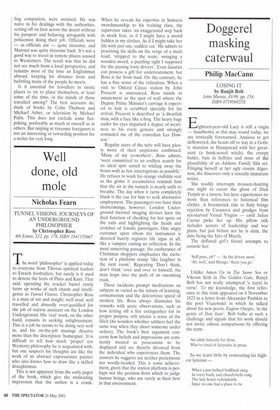Well done, old mole
Nicholas Fearn
TUNNEL VISIONS: JOURNEYS OF AN UNDERGROUND PHILOSOPHER by Christopher Ross 4th Estate, £12, pp. 178, ISBN 1841155667 The word 'philosopher' is applied today to everyone from Tibetan spiritual leaders to French footballers, but rarely is it used to denote the heirs of Plato and Kant. That said, upending the cracker barrel rarely turns up works of such charm and intelligence as Tunnel Visions. Christopher Ross is a man of wit and insight; well read, well travelled and absurdly over-qualified for the job of station assistant on the London Underground. His 'real' work, on the other hand, consists in seeking enlightenment. This is a job he seems to be doing very well in, and his on-the-job musings deserve more than the description 'homespun'. It is difficult to tell how much 'proper' (or Western) philosophy he is acquainted with, but one suspects his thoughts are like the work of an abstract expressionist painter who also knows how to draw like a skilled draughtsman.
This is not apparent from the early pages of the book, which give the misleading impression that the author is a crank.
When he reveals his expertise in Samurai swordsmanship to his training class, the supervisor takes 'an exaggerated step back in mock fear, as if I might have a sword hidden in my clothes. As if I might take her life with just one, sudden cut.' He admits to practising his skills on the verge of a main road, 'stripped to the waist, swinging a wooden sword, a puzzling sight I supposed for the passing lorry drivers'. Even lunatics can possess a gift for understatement. but Ross is far from mad. On the contrary, he has a fine sense of the ridiculous. When a visit to Oxford Circus station by John Prescott is announced, Ross stands in amazement as the spot of wall where the Deputy Prime Minister's carriage is expected to halt is scrubbed specially for his arrival. Prescott is described as 'a dwarfish man, with a face like a frog. The heavy bags under his eyes imparted a degree of weariness to his every gesture and strongly reminded me of the comedian Les Dawson.'
Regular users of the tube will have plenty more of their suspicions confirmed. 'Many of my co-workers', Ross admits, 'were committed to an endless search for an ideal spot suited to whiling away the hours with as few interruptions as possible.' He refuses to wash his orange visibility vest as the grime it accumulates reminds him that the air in the tunnels is nearly unfit to breathe. The day when it turns completely black is the cue for him to seek alternative employment. The passengers too have their shortcomings, however. London Underground thermal imaging devices have the dual function of checking for hot spots on the rails and highlighting the heads and crotches of female passengers. One angry customer upon whom the instrument is directed barely registers life signs at all, like a vampire casting no reflection. In the most unnerving passage, the exuberance of Christmas shoppers emphasises the exclusion of a platform tramp 'like laughter in the next room'. Repeating 'Don't think, don't think' over and over to himself, the man leaps into the path of an oncoming train.
These incidents prompt meditations on subjects as varied as the nature of learning, consumerism and the deleterious speed of modern life. Ross always illustrates his remarks with acute observations, such as how letting off a fire extinguisher for its proper purpose still retains a sense of the illicit (he wonders whether soldiers feel the same way when they shoot someone under orders). The book's best argument concerns how beliefs and impressions are commonly treated as possessions to be displayed and are thereby divorced from the individual who experiences them. The answers he suggests are neither pretentious nor woolly-headed. This is some achievement, given that the station platform is perhaps not the position from which to judge human beings, who are rarely at their best in that environment.


















































































 Previous page
Previous page